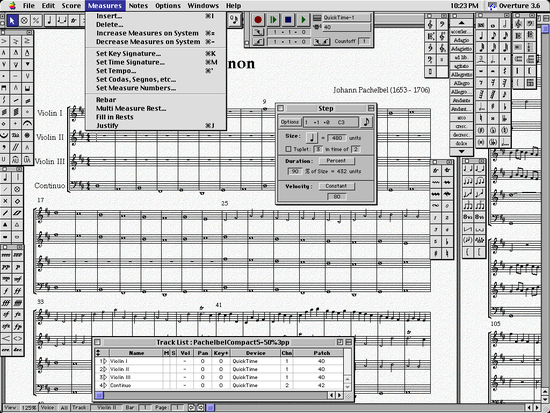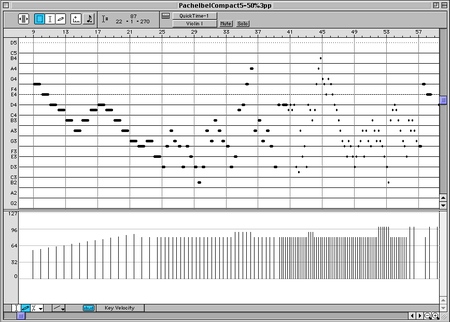- Overture (software)
-
Overture is a music scorewriter program for Windows and Macintosh platforms, written by Don Williams, the author of the popular Encore scorewriter program. Visually, the Overture interface bears much resemblance to the Encore interface. Overture is the first scorewriter program to feature full Virtual Studio Technology (VST) hosting[1]. While the software is designed primarily as a scorewriter, it is also capable of editing not only the notes, but also playback data in MIDI files.
Contents
Current Version
Overture is, as of July 2011, currently up to version 4.1.5.
Features, Note Input and Editing
In Overture, input of note data can be done by any of several methods: QWERTY keyboard note entry, mouse click entry, step entry MIDI keyboard recording, or real-time MIDI keyboard recording. Most notational symbols can be repositioned simply by dragging them with the mouse. Most other editing of notational symbols is performed by selecting the symbols using the mouse, and selecting the appropriate editing command from a menu or by clicking on a palette. MIDI data is edited in a special graphical view, where each note appears as a bar on a piano roll. The MIDI data is edited simply by adjusting the bars by dragging with the mouse.
Background and Notability
Because of the complexity of producing musical scores to publishers' standard, it took a long time for scorewriter software capable of producing professional-quality scores containing complex or non-standard notation, to be developed.
In the early 1990s, WYSIWYG the music notation software market was dominated by the Finale program, published by Coda. It was capable of handling large, complicated scores and non-traditional notation. However, its immense power and flexibility came at the expense of making the software, as it was then, extremely difficult to learn to use, due to its large number of operating modes. Different musical markings could only be edited when the user had first selected the appropriate editing mode, making editing a very laborious task in comparison to editing in more recent versions of Finale or other programs.
At the same time, a number of music scoring programs with more intuitive user interfaces became available, of which Encore became the most popular. Encore was first published by Passport Designs, and featured in which notes could be added simply by clicking on the staffs with the mouse pointer; and most notational elements could be selected using the mouse.
A notable survey of this situation, and the music notation software of the time (at that time largely dominated by programs for the Macintosh), was published by Professor Alan Belkin of the University of Montreal. Among other issues, it pointed out the differences between these two approaches to scorewriter software design, and the problems associated with each approach.[2]
In an effort to produce a music notation program that was both extremely user-friendly and having powerful features, the author of Encore, Don Williams, wrote a new program called Overture. Overture was based on Encore's intuitively designed and user-friendly interface,[3][4] yet it is capable of producing large complex scores, handling non-standard music notation (such that found in avant-garde and early music), while also giving full control of all MIDI playback data.
Overture is notable for being the first easy-to-use WYSIWYG notation package which could produce professional scores containing non-standard notation such as noteheads with non-standard shapes; or staffs with other than five staff lines.[5]
Overture is also notable for being the first music notation software which gave the user control over all MIDI playback data, which is invisible on the score (such as note velocity, pitch bend and duration). The software introduced a MIDI data editing view where the notes appear as strips on a scrolling piano roll, and can be moved and edited using the mouse.
The program was one of the first music notation packages to always show the score in WYSIWYG page view. Most previous music notation packages either lacked a WYSIWYG view, or swapped between a scrolling editing view and a page view used for print previews or certain editing functions.
Publisher
Overture was originally published by Opcode Systems. It was later published by Cakewalk Inc. It is, as of 2009, published by Geniesoft, in both boxed and downloadable versions.[1] A much cheaper, scaled-down version of Overture, called Score Writer, is also published. Demonstration versions of both Overture and Score Writer are available for download on the Geniesoft website.
See also
- Finale (software)
- Encore (software)
- Scorewriter
- MuseScore
- Sibelius (computer program)
- Music publishing
- MIDI
References
- ^ http://geniesoft.com/products/overture/overture.htm
- ^ Belkin, A. (1994). Macintosh Notation Software: Present and Future. Computer Music Journal, 18, (1), 53-69. http://www.jstor.org/pss/3680522
- ^ The author has written postings concerning the ongoing development of the software at http://geniesoft.com/forum/index.php
- ^ Encore is currently published by GVOX
- ^ http://geniesoft.com/products/overture/overture.htm
External links
- Overture on the Geniesoft website
- Review of Overture by Prof. Thomas Wells, Ohio State University[dead link]
- Overture demonstration version and user manual download page
Scorewriters Open source Denemo • Frescobaldi • GNU LilyPond • Impro-Visor • MuseScore • MusiXTeX • NoteEdit • Rosegarden • TuxGuitarFreeware Proprietary Capella • Encore • Finale • Guitar Pro • Igor Engraver • Mozart • Mus2 • MusEdit • MusiCAD • Music Write • NOTION • NoteWorthy Composer • Overture • SCORE • Sibelius • SmartScoreList of scorewriters • Comparison of scorewriters Categories:- Scorewriters
Wikimedia Foundation. 2010.


